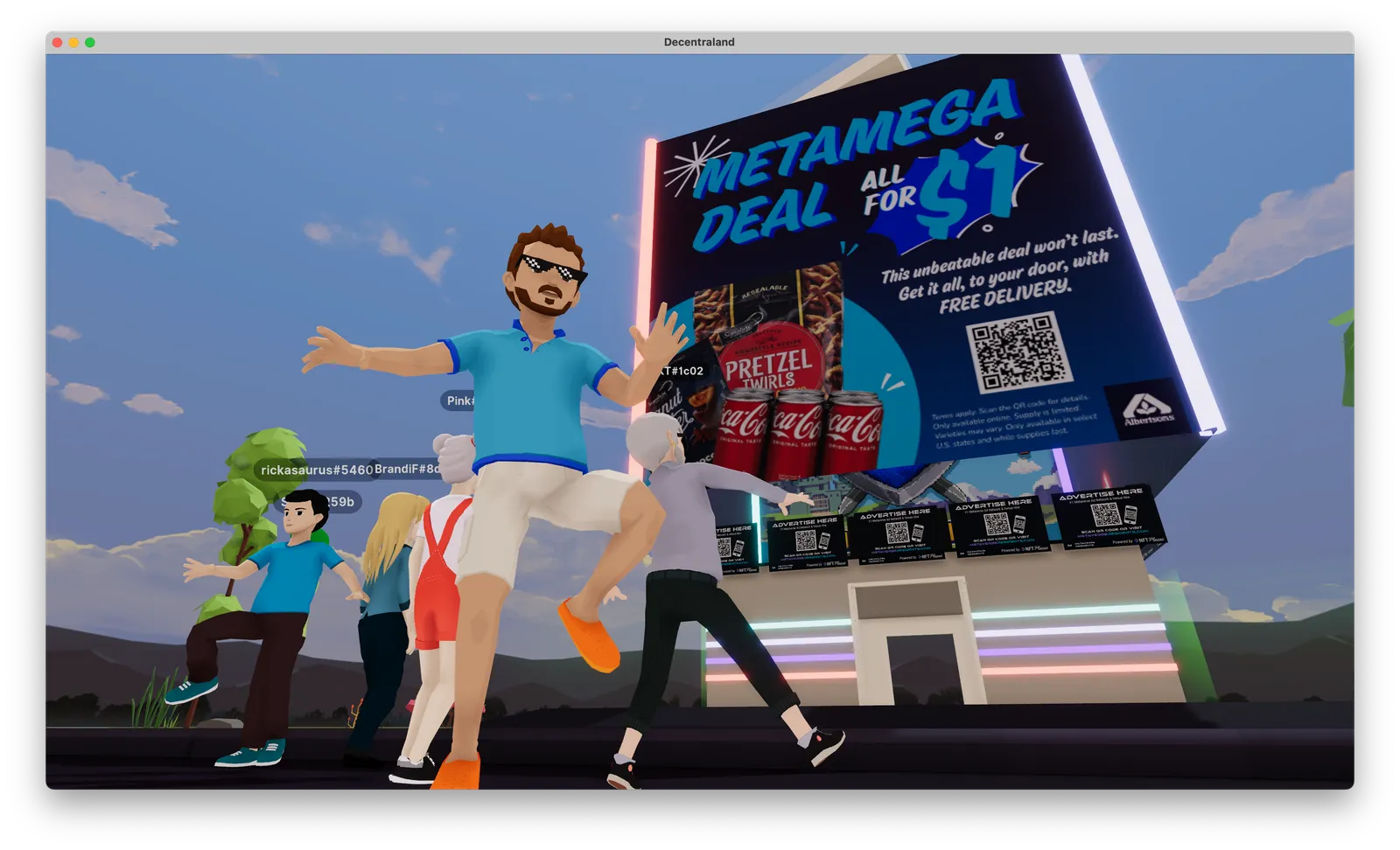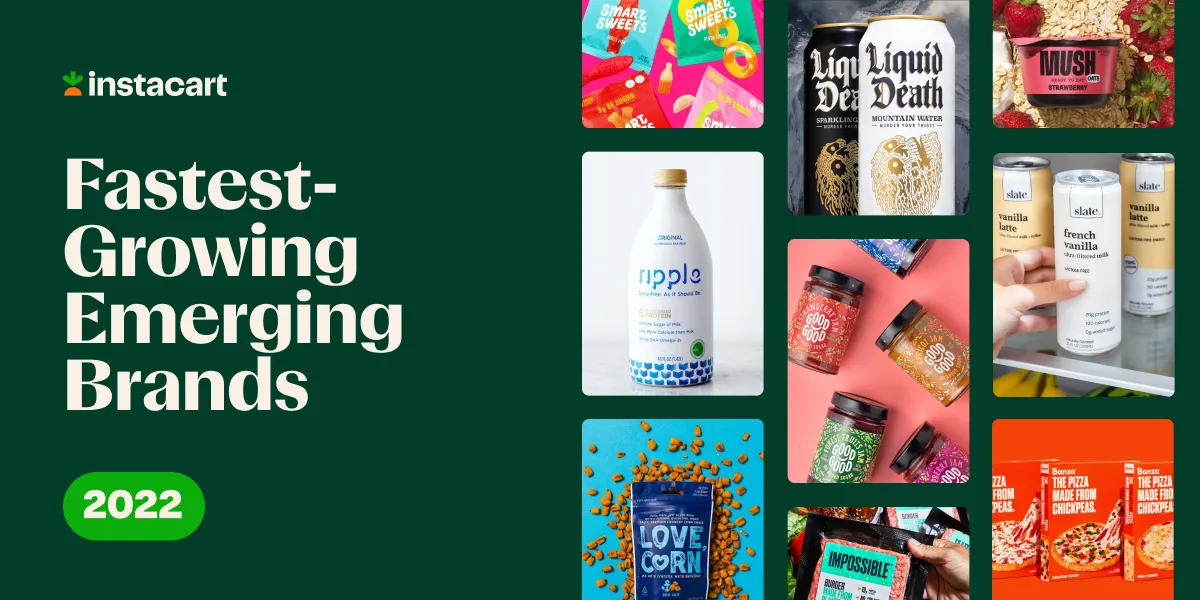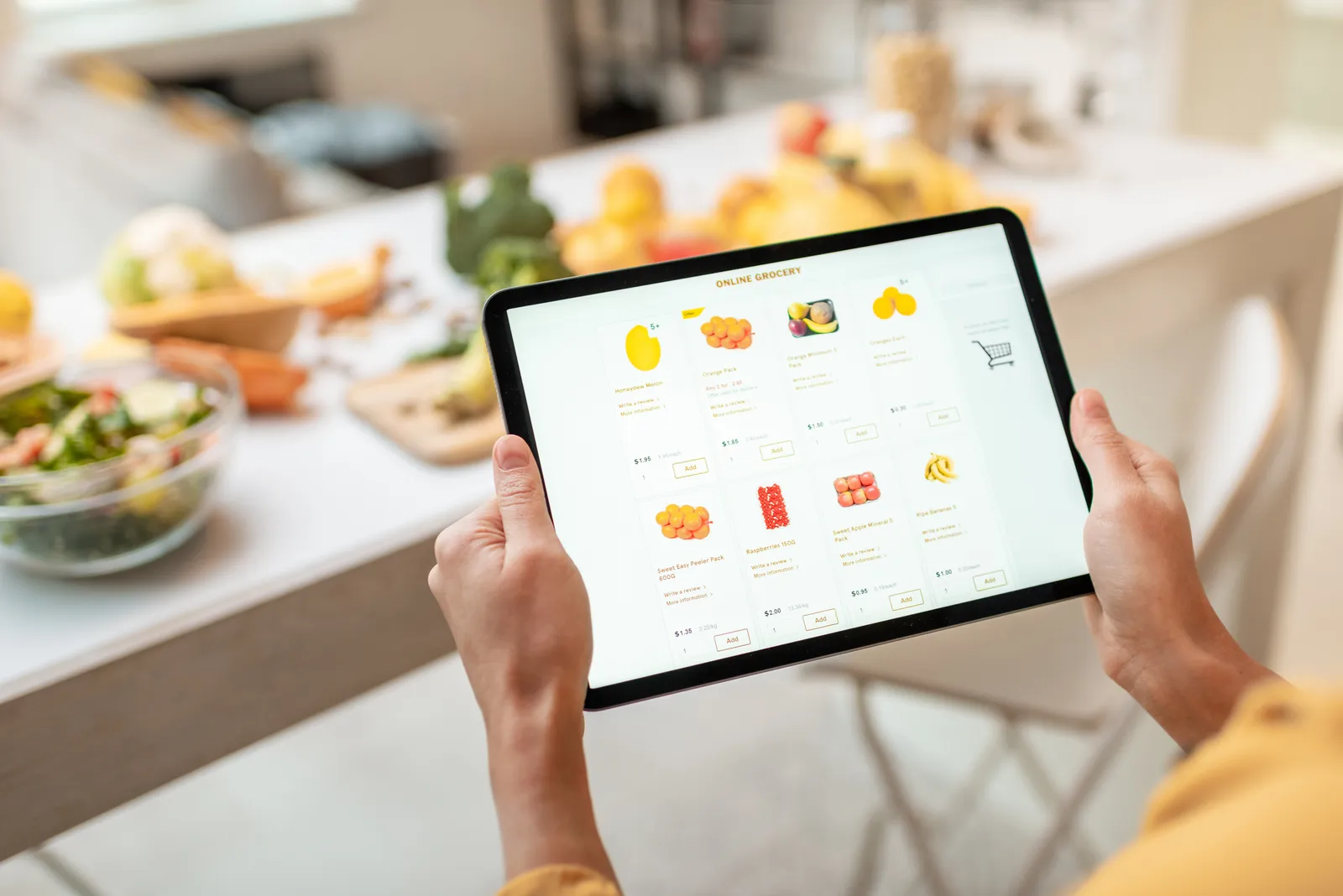The Friday Checkout is a weekly column providing more insight on the news, rounding up the announcements you may have missed and sharing what’s to come.
We have entered a day and age where we can shop via our AI-avatars.
And yes, this is still a baffling concept for many.
On Cyber Monday this year, Albertsons launched a piloted experience with Decentraland where users could, for $1, purchase Signature Select pretzels, peanut butter cups and a six-pack of mini Cokes in the metaverse to be delivered in real-time to their front doors. The grocer simply displayed 25 virtual billboards with QR codes in the 3D virtual browser-based platform for users to scan and place the limited-time order.
This metaverse deal, appropriately named the Meta Mega Deal, marks Albertsons as the first grocer to sell and deliver tangible goods in the metaverse.
But is this what consumers actually want?
Utilizing the metaverse has been more popular in the non-food retail sectors, with Puma, Gucci, Gap and Timberland all entering the virtual space in recent months. For these retailers, the metaverse is an advertising opportunity, a way to showcase their products and a strategy to engage shoppers. There is still hesitation, however, about fully enabling metaverse experiences in the grocery sector.
“People do not want to do their grocery shopping in a virtual supermarket in their spare time,” Viv Craske, founder of Geeky Food and advisor for food tech and retail tech startups, said in a post earlier this year on LinkedIn.
Craske continued: “We've been here before with AR experiences like Blippar. That didn't make sense for grocery brands. And neither does the metaverse.”

But familiarity with the metaverse is growing as Wunderman Thompson Intelligence recently shared findings that 74% of surveyed consumers have heard of the metaverse as of March — a jump from 32% surveyed at the same time last year. And, building off of this, 68% described it as the “next internet” and 74% called it representative of the future.
However, only 15% of surveyed consumers actually feel they would be able to explain what the metaverse is, and worries persist from parents surrounding child safety and privacy.
For grocers, the metaverse could potentially provide some benefits: A post earlier this year on marketing attribution platform Wicked Reports predicted the metaverse will help grocers with staff shortages and navigate supply and demand challenges, as well as optimize the customer experience.
Though it is a slow adoption, grocers are beginning to experiment in virtual worlds. At Groceryshop in Las Vegas this past September, Shipt and Meta showcased their grocery order picking game. Though players were able to select groceries in the game, it was still no more than a game — not yet a tool that consumers could use to grocery shop from their couches.
So, could 2023 be the year grocers fully tackle the metaverse? Albertsons' trial could help pave the way.

In case you missed it
Instacart is sharing the emerging brands it has its eyes on
What’s trending and which products will be breakout stars? Instacart wants people to know it’s got its finger on the pulse of what’s hip and upcoming, releasing its first-ever list of the 75 fastest-growing emerging brands on its marketplace in 2022.
The list includes better-for-you options, such as vegetarian meals from brands like Tattooed Chef; sparkling beverages with a twist, like a collagen boost in SkinTe and prebiotics in Poppi; and allergen-free snacks from MadeGood and Love Corn.
The grocery technology provider has even set up an online hub where people can shop items on the list from nearby retailers.
The timing of Instacart’s list of emerging brands comes as retailers and consumers look to the year ahead — with specialty grocers, in particular, rolling out 2023 trend predictions.
Publix expands e-commerce use cases to hospitals
The grocery chain announced this week that it is now offering bedside prescription delivery at Manatee Memorial Hospital in Bradenton, Florida. The service allows the hospital’s patients to get prescriptions before they’re discharged.
A Publix store in Palmetto, Florida, will handle the insurance authorizations and fill the order for the Manatee Memorial Hospital deliveries, which can go directly to the patient or the nursing unit, the grocer said. Patients can pay for their prescriptions upon delivery and also get refills for the future from any of Publix’s pharmacies.
The bedside delivery builds on Publix’s efforts to expand its pharmacy e-commerce offerings. In August, the grocer announced it has started offering curbside pharmacy pickup at select stores in Florida, Georgia, Alabama and Virginia, with plans to bring the service to its pharmacies in North Carolina and South Carolina.
The announcements highlight how Publix is getting creative with expanding use cases for online ordering and looking to make customers’ lives easier. It’s a good reminder that grocers have more unexplored areas in pickup and delivery.
Ahold Delhaize (again) ties sustainability goals to line of credit
The Dutch grocery company said this week it has closed a €1.5 billion ($1.6 billion) revolving credit facility linked to its sustainability objectives. This line of credit enables Ahold Delhaize to tie its costs of borrowing with its progress on sustainability key performance indicators (KPIs), including three KPIs focused on reducing the company’s carbon emissions within its own operations, decreasing food waste and helping consumers make healthier choices.
The grocery company has the opportunity to add targets regarding Scope 3 emissions — a business’s indirect emissions from suppliers, producers and farmers — to the facility, per the press release.
Late last month, Ahold Delhaize updated its CO2 emissions target by pledging to reduce Scope 3 emissions by at least 37% by 2030.
This isn’t the first time Ahold Delhaize has turned to this type of loan. The grocer announced a €1 billion sustainability-linked line of credit at the end of December 2020.
In March 2021, the company announced the pricing of a €600 million sustainability-linked bond. In 2019, the company became the first retailer to issue a euro-denominated sustainability bond in 2019, according to ESG Today.

Number of the week: 60%
That’s roughly the percentage of Shipt orders that contain items in customers’ carts that are on sale, the Target-owned e-commerce provider noted in its newly released second annual business report.
That statistic jumps out due to shoppers’ focus on savings during ongoing high inflation and food prices that have persisted for months.
“[In] addition to consistent promotions, we introduced ‘Dealivery Days’ to provide customers with valuable deals this holiday season on the products and categories most impacted by inflationary prices,” Shipt CEO Kamau Witherspoon said in the report. “These cost-saving programs have a direct impact on customer’s wallets.”
What’s ahead
Next key Albertsons’ dividend date
In Washington state, a temporary restraining order pausing the payout of Albertsons’ $4 billion special dividend remains in place until Monday.
Last Friday, a Washington state court judge denied a request by the state’s attorney general for a preliminary injunction to block the dividend payment but extended the temporary restraining order to give the attorney general time to ask another court to review the decision.
A group of attorneys general from California, Illinois and the District of Columbia is also seeking to block the dividend payment, and Colorado’s attorney general is supporting the Washington state attorney general.
Opponents of the dividend argue it could severely weaken the grocer financially and impede its ability to compete in the industry as the proposed Kroger-Albertsons mega-merger undergoes regulatory scrutiny. Albertsons has called the concerns “meritless,” saying its opponents have “no legal basis for preventing the payment of a dividend that has been duly and unanimously approved by Albertsons Cos.’ fully informed Board of Directors.”
“Happy holidays” from Grocery Dive!
We’ll be on a daily publishing break starting next Friday, Dec. 23. Our regular daily newsletter will hit your inbox Wednesday, Jan. 4. During that time, watch your email for some special content from us.
“The Friday Checkout” column will return once again in the New Year starting on Jan. 6. If you made it this far down, thank you for being a loyal reader!
We wish you a safe, healthy and merry winter and a prosperous New Year!




















